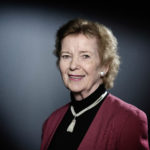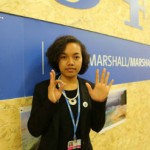How the youth movement will affect climate change
Speakers
-

Chair of The Elders, The Elders
Mary Robinson was elected Irish President in 1990 and served for seven years as a principled and transformative leader who fought for equality and women’s rights throughout her time in office. A firm believer in dialogue and reconciliation, she broke taboos by being the first Irish head of state to make official visits to Britain, as well as regularly visiting Northern Ireland. As UN High Commissioner for Human Rights (1997-2002), Mary Robinson became renowned as an outspoken voice dedicated to investigating and exposing human rights abuses across the world.
Mary Robinson has been a member of The Elders since the group was founded in 2007 and was appointed Chair of The Elders in November 2018. She has travelled to the Middle East several times with The Elders to encourage peace efforts and support Israelis and Palestinans working for peaceful coexistence; visited the Korean Peninsula to help ease tensions between North and South Korea and learn more about North Korea’s chronic food crisis; joined an Elders' delegation to Côte d'Ivoire to emphasise the importance of reconciliation following widespread civil conflict.
Mary Robinson also founded The Mary Robinson Foundation – Climate Justice. Its work from 2010-2019 meant climate justice went from being effectively a taboo topic to being an approach to climate decision-making and action that is people-centered, rights-informed and fair.
-

Student, UWC Robert Bosch College
Selina Neirok Leem, an islander from the Republic of the Marshall Islands, is currently attending her last year of high school in the UWC (United World College) Robert Bosch College in Freiburg, Germany. The school is a prestigious international program that offers the International Baccalaureate Diploma. Prior to her coming to Germany, she was a student of the Marshall Islands High School.
Until she was 16 and moved to Germany, she spent her entire life on her home atoll, Majuro, also the capital of the country. She grew up with her large family; her grandparents, her parents, her uncles and aunts, her cousins, and her six siblings. Selina was influenced a lot by her grandparents who would tell her Marshallese stories and legends before she went to bed. They also emphasized the importance of education, taught her Marshallese values, and so much more.
She credits her grandfather for her deep awareness of the increasing fate of her island home through his stories about how the ice in the North Pole and South Pole were melting and would soon flood the Marshall Islands. He helped her become much more aware of her surroundings, of the fact that she was literally surrounded by water.
Coming to Germany, Selina took on the role of a climate change advocate for her country. She saw all that had happened throughout her years of living on her atoll as the changing of the climate became more prominent and wanted to share with whomever she came across. She was even more inspired when she saw that she could reach a much wider audience here in Europe in order to spread more awareness.
Representing the Marshall Islands, Selina was the youngest delegate at the COP21 in Paris. During the closing remarks, then Marshall Islands Foreign Minister Tony deBrum gave her the opportunity to give the final statement on behalf of her country. She told the world that Paris agreement, “should be the turning point in our story; a turning point for all of us.”